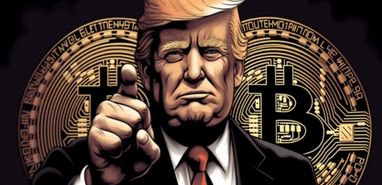
Crypto is Trump’s New Weapon Against Biden
It’s the first time crypto has become an issue in the general election of a presidential race.
Trump’s Appeal to Crypto Supporters
Donald Trump is making presidential history once again: He’s poised to be the first major party nominee to court cryptocurrency traders. This move is leaving some Democrats feeling uneasy.
Trump told crypto supporters at Mar-a-Lago on Wednesday that they “better vote” for him because of the Biden administration’s regulatory crackdown on the industry.
“They are against it,” he said at an event promoting his own non-fungible token (NFT).
GOP’s Shift Toward Crypto
Trump’s clear play for the crypto faithful is a significant shift from the criticism he delivered in his initial term, but it’s not surprising. The GOP has become increasingly friendly toward bitcoin and other digital assets in recent years, while key Democrats remain divided on whether to grant the industry legitimacy following a series of scandals. Trump’s direct embrace marks a milestone moment for crypto firms that have engaged in an intensive Washington lobbying effort, spending millions of dollars to influence the 2024 elections.
Regulatory Challenges Under Biden
“President Trump’s comments signal a sea change in the importance of digital assets this election cycle,” said Kristin Smith, CEO of the Blockchain Association, a top crypto industry lobbying group.
The issue is providing Trump with a new line of attack on Biden. Securities and Exchange Commission Chair Gary Gensler, a Biden nominee, has pursued an extensive series of enforcement actions against crypto firms that he says are violating federal securities laws. The White House on Wednesday angered crypto advocates when it threatened to veto bipartisan House legislation that would amend SEC rules the industry dislikes.
“Gensler is especially against it,” Trump said Wednesday of the administration’s approach to crypto. “The Democrats are especially against it.”
Democrats’ Divided Stance on Crypto
Not all Democrats are against it. Twenty-one Democrats on Wednesday defied Biden’s veto threat and joined Republicans in voting for a resolution to overturn SEC crypto guidance. Trump’s embrace could add a new partisan tone to the debate over crypto regulation — a risk for the industry, which is courting both sides.
Following Trump’s remarks, Rep. Wiley Nickel, a pro-crypto North Carolina Democrat, wrote on X that his party “can’t hand this issue to the Republicans.” However, key Democrats like Sen. Elizabeth Warren (D-Mass.) have blocked industry-friendly policies while warning of risks to consumers and the financial system, as well as crypto’s role in financial crime.
Public Perception of Crypto
It’s unclear, though, whether courting digital asset traders can win a significant number of votes. A Pew Research Center survey released last year found that most Americans weren’t confident in crypto’s safety or reliability. The industry has experienced major blowups over the last few years, including the collapse of the FTX exchange in a massive fraud scandal and the U.S. government’s $4.4 billion settlement with the Binance exchange over allegations that it facilitated financial crimes.

Crypto’s Electoral Impact
A poll released by crypto industry groups this week showed that more than 20% of voters in six key swing states identify crypto as a significant issue. A separate nationwide survey of registered voters commissioned by the crypto firm Paradigm found that crypto ownership is higher among communities of color and young people — key constituencies that helped lift Biden in 2020 but are now proving challenging for him to win over.
Political Support for Crypto
Crypto has gained support from politicians on the right who tout it as an alternative to the mainstream financial system. The Paradigm poll found recently that crypto owners favor Trump over Biden, 48% to 39%, with 13% undecided.
“President Trump understands freedom and liberty, he knows that innovation must be protected here in America, and he knows that the role government should play is to ensure we create an environment where innovation grows and thrives,” said Ohio GOP Senate candidate Bernie Moreno, a longtime crypto advocate. “That’s why it’s no surprise to see him making those comments about crypto.”
Ramaswamy’s Influence on Trump
Former Republican presidential hopeful Vivek Ramaswamy, who is considered a potential cabinet official in a second Trump administration, endorsed crypto during the GOP primary and helped push the former president to publicly oppose the adoption of a government-backed central bank digital currency. Crypto firms also oppose a potential Federal Reserve digital currency, and conservatives warn it poses a threat to privacy.
“I was impressed with President Trump’s ability to dive deep into a subject area that was newer to him,” Ramaswamy said in an interview last month.
Trump’s Crypto Journey
Ramaswamy declined to comment on whether he hopes to handle crypto policy in a second Trump administration, saying he is “focused on winning the election.”
Trump’s support for digital assets wasn’t always a given. He scorned crypto on social media during his presidency, and key cabinet members took a skeptical approach to the industry. Trump’s SEC chair initiated major litigation against a prominent crypto firm.
However, Trump has continued to dabble in crypto since leaving office. He has issued his own NFT, and as of last August, he owned $2.8 million in a crypto wallet.
Potential Risks of Embracing Crypto
“It’s pretty impressive to see, in the few years since he’s left office, the 180 that he has done on crypto,” said Cody Carbone, chief policy officer at the Chamber of Digital Commerce, a crypto advocacy group. “It’s great to see him come out and be supportive of the industry.”
Trump’s embrace of crypto carries potential risks. Digital asset markets have experienced dramatic ups and downs in recent years, and key industry players like Sam Bankman-Fried have been sentenced to prison time for breaking the law.
Implications for the Crypto Lobby
The shift also carries risk for Washington’s crypto lobby. Trump could make the politics of digital asset regulation even more partisan going forward. The industry has spent years — and millions of dollars in campaign contributions — trying to build support in both parties, which will likely be crucial to enacting the legislation that crypto firms want.
“I don’t want this to become a partisan issue,” Carbone said. “I think this presents an opportunity for Democrats to start to really have a reflective look and educate themselves on the benefits of digital assets.”








By Andrej Kovacevic
Updated on 14th July 2024